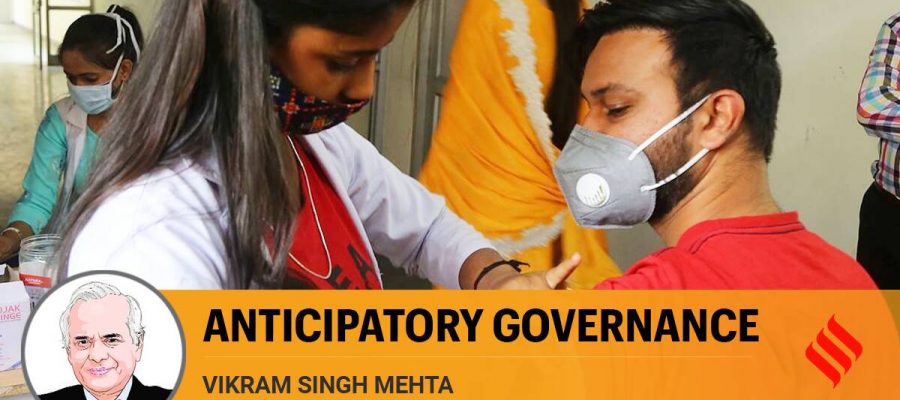No single entity, whether government, corporate or civic society, has the tools to manage the fallout
Government, business and civil society must face up to one unalterable reality. Covid-19 will not be the last disruption. It could be another pandemic, a natural disaster, a cyberware attack, perhaps a “hot” collision between the incumbent superpower, the US and the ascendant challenger, China, a social upheaval or artificial learning (AI) gone rogue. Whatever the cause, they should expect another systemic disruption.
The question is: What must they do to better anticipate, prevent (if possible) and manage (if prevention is not possible) the fallout? My (partial) answer to this question is influenced by two observations.
One, Covid-19 has established the importance of collaboration. The vaccines could not have been developed in record time without the collaborative effort of governments, industry, scientists and academics. Governments supported the pharma companies with funds, experts joined hands across boundaries and institutions and all entities were aligned towards the common purpose of countering the virus. The vaccination programme in India has moved faster in those states where governments have brought in the private sector and solicited expert advice than those where decisions have been made inside the siloed chambers of bureaucracy and politics.
Two, the severity of the impact of the second wave on the management cadre of corporates. SEBI requires corporates to inform it of any change in the composition of their board and/or their key management personnel (KMP). The data submitted has revealed that 24 companies lost one or more of their Board Directors or KMPs to Covid in March and April. By logical extension, it can be assumed the numbers of those in the second tier were comparably high.
This is a shocking statistic and casts a pall over what otherwise has been a commendable performance by corporates to manage the pandemic.
I have a foot in the corporate world as a non-executive independent director. From that perch, I have observed the response of the larger listed companies to the first wave. It was impressive. They used the hiatus to refashion their business models, cut out unnecessary flab, digitise operations and leverage technology to identify and pursue new opportunities. The results of the last quarter of FY 20/21 (January-March) reflects their efforts. All major parameters of financial performance (net sales, operating margin, cash flows, profits) were, on average, substantively in the black. The current quarter results will be relatively poor because of the lockdowns but the fact remains that many companies are more competitive today than a year back.
Set against this backdrop, the tragic HR data does prompt reflection.
Do corporates have sufficiently robust risk management systems in place to identify, prepare and manage the emergent risks of a fast changing, dynamic, networked and hyper-connected world? Do they have the tools to handle the unexpected fallout of a systemic disruption? No one should misunderstand these questions to imply that corporates should have been better prepared to stave off the HR implications of the second wave.The purpose of these questions is to simply reflect on the learnings to be distilled from the fact that despite the commendable manner in which they managed the direct financial and operational impact of the pandemic, they did not foresee its indirect and rippled ramifications.
Most companies have well-established risk management systems and processes. These work well in identifying and managing predictable operational, commercial and financial risks including those arising from known geopolitical and geoeconomic forces. But they are less effective in conditions of flux and unpredictability. This is because the methodologies follow a predetermined pathway and questions. As a result, even when the external conditions require the lens to be turned outward, the approach remains tunnel visioned.
Dovetailing these two observations, I have two suggestions in response to the question I posed at the start of this article.
First, Indian companies should redesign their risk management systems. They should loosen the straitjacket and create processes that encourage the asking of counterfactual “what if” questions. They should also share information with their corporate peers about emergent systemic risks — for example, cybersecurity; global warming — and institutionalise a mechanism for inter-sector collaboration on risk management.
Second, the government should set up a National Risk Management Committee. This committee should comprise members from industry, government, and civil society. It should be chaired by a non-government person recognised for their intellect, leadership and public service. Two names come immediately to mind: Azim Premji and Nandan Nilekani. The government should be represented at the highest level. The cabinet secretary and the secretary to the PM would give it the required heft. Members must also include renowned domain experts and intellectuals. The committee should be non-partisan and protected by an Act of Parliament. It should be financially autonomous. And its purpose should be to identify the unexpected, develop scenarios of alternative futures, coordinate responses and influence political and bureaucratic mindsets.
We do not know what will trigger the next disruption, when it will occur, how widespread its impact will be. But what we do know is that when that happens, the fallout will be multidimensional, multi-sectoral and possibly multinational. We also know the Covid truth, “No one is safe anywhere unless everyone is safe everywhere” will apply to future disruptions. We also know that to stave off another human crisis everyone will have to work together. This is because no single entity, whether government, corporate or civic society, has the tools to manage the consequential fallout.
This leads to only one conclusion. The world and India have no alternative but to build institutions that foster collaborative “anticipatory governance”.
This column first appeared in the print edition on June 7, 2021, under the title “Anticipatory governance”. The writer is chairman, Centre for Social and Economic Progress
Source: Read Full Article


